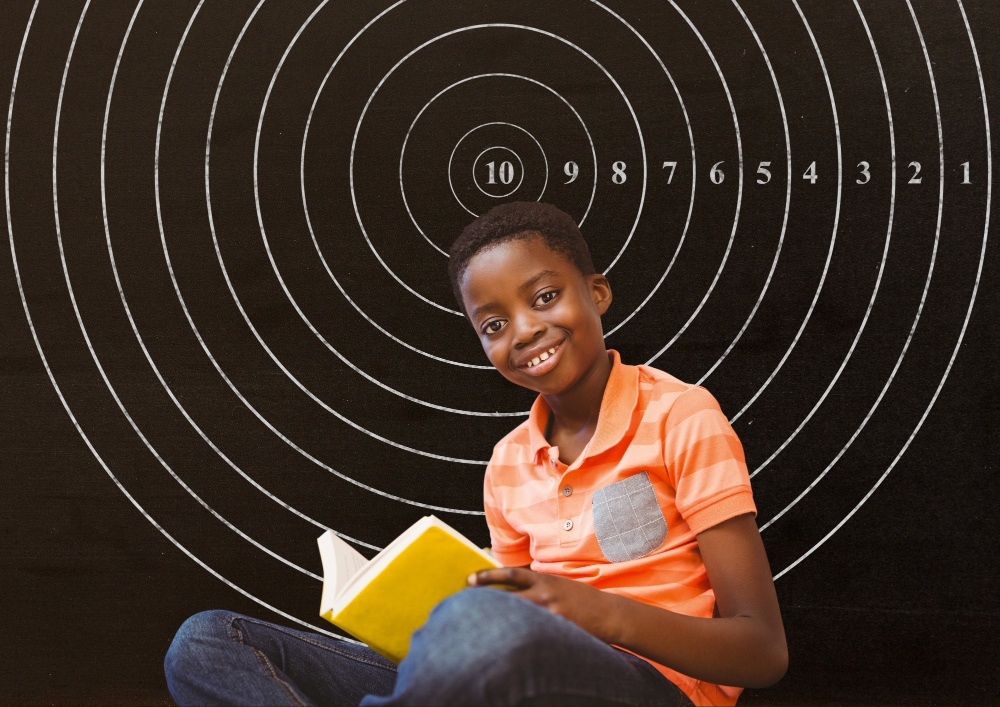
NEW START, NO STRESS
Ms M Joosten, Head of Foundation Phase
A new school year comes with a lot of mixed feelings and emotions. While most children feel joy and excitement for all the ‘newies’ that are lying ahead, it fills others with mixed feelings of stress and anxiety. There are different reasons why a new school year can be stressful for some children.
It may be your child’s first day at a new school. A new school comes with new learners, teachers, routine, environment and possibly even new languages. Encourage your children by speaking to them. Make the new school sound exciting and positive. Expose them positively to all that they can look forward to at their new school. Stay on track with all their school activities and make them aware that you are in this new experience together with them.
Some children face stress and fear because they must repeat a grade. To return to the same grade makes them feel like a failure. Make sure that you have spoken to your child about the situation before the start of school. Let them know that you are there for them if they need help and they do not need to be quiet about challenging work. Tell them that they are not the only ones that have had to repeat a grade and that it will ultimately help them. Be involved in your child’s learning as much as possible. Encourage them and make them feel that they can do it.
A new grade can be stressful for children. They might only see a mountain of work and new teachers who are waiting for them at school. Some children are encouraged by talking them through the worst-case scenario and making them laugh about it. Get them excited for the new grade and show them their progression.
We can all relate to stress and fear at some point in our lives. Support your children and show them that with a little help from you they can overcome these emotions when facing a new school year.
Sources Easing Into the New School Year (linkedin.com)
How to Reduce Stress and Anxiety About the New School Year – Family Resources (familyresourcesinc.org)

ACADEMIC EXCELLENCE
Mrs E Gouws, Head of Intermediate Phase
Once again, Domino’s excellent matric results have placed the spotlight squarely on academic excellence, one of the four pillars of the school – respect, responsible citizenship, academic excellence and Bible-based moral values.
Academic excellence starts at primary level because ‘you pass matric in Grade 1’. Academic success at primary levels will ensure success at high school level and ultimately in after-school studies.
Academic success often relies on particular skills that help people study, retain and apply information. Academic skills are the abilities, strategies and habits that can help learners succeed. (Indeed.com)
“Parents are key players in the development of a child’s character, confidence, motivation and personal responsibility for schoolwork – all of which contribute to the child’s academic and personal well-being,” says Julie Vaughan.
What academic skills could parents help their children develop to ensure success at school?
Time management
Time management is the thinking skill that helps children to estimate how long it will take to do something, complete tasks on time, and not waste time.
Reading comprehension
“Reading is key to a child’s success in school, and it begins with their first teachers: their parents,” says Pamela Whitlock.
Computer skills
All children need some good computer skills to succeed at school such as typing, coding, using simple applications such a Word, PowerPoint, as well as online research skills.
Self-discipline
Self-discipline is the ability to make yourself do what you should do.
Critical thinking
Critical thinking, simply put, is thinking about thinking. It is the process of analysing facts in order to make a judgment. (98thpercentile.com)
Group work
Working with others is a valuable skill which will reappear throughout a child’s life. It teaches children how to engage with others respectfully and best use each other’s strengths and weaknesses.
Writing
Writing enhances critical thinking. It helps organise thoughts. It encourages creativity and imagination. It is an essential life skill.
Taking constructive criticism
Sometimes the best life lessons come from failures or learning how not to do something.
Finally, praise and encouragement go a long way to developing the academic skills for success.
Be your child’s biggest cheerleader.
Sources: 12 Examples of Academic Skills (Plus Tips To Improve Them) | Indeed.com
10 ways to boost your child’s academic potential – Focus on the Family Canada

NO PLACE LIKE HOME
Mrs N Ngubane, Head of Senior Phase
The most desirable bell in the learner’s ear is the one after school, signaling that it is time to go home. Yes, your child longs to be back at home – no matter how well-planned the teachers were or how entertained your child was at school. Home sounds right in the ear and comforts the heart of your little one. Why not make a home a place of safety, rest, learning, eating, discipline, fun, spiritual growth and more?
Place of safety
Your child should know that he is safe at home and when he is reprimanded, it is all for his protection and in his best interests.
A place of rest
Your child needs to sleep enough hours. Help your child do his homework and chores timeously so that he can go to bed early enough. According to Psychology Today a child must sleep at least for 8 hours. The National Sleep Foundation provides these daily sleep guidelines:
Infants (4-11 months): 12-15 hours
School-age children (6-13): 9-11 hours
Teenagers (14-17): 8-10 hours
Does rest only mean physical sleep? No. He must know that God cares for him and therefore he should cast all his anxieties onto Him. (1Peter 5:7). If I, as a parent, am restless, will my child be able to learn from me that God cares? Have an ear to hear and a heart that rests in God, then it will be easy help your child to find rest and trust your loving intentions.
A place of learning
Take time to teach your child valuable life lessons. The best ones come from the Bible. As young as your child may be, he needs time to learn from you. He needs to learn how to conduct himself – whether he passes his assessments or not; whether other children treat him well or not; whether you are there or not.
Mealtimes
Food is so important for your child. Make sure your child eats healthily. Give him a good breakfast and set a good example. Remember it does not need to be fancy, but nutritious. How about a little snack at break time to prepare your child’s brain for more lessons? Lunch must be something to look forward to.
A place of discipline
Wherever your child is, he represents you and the whole family. Be sure he does not bring disgrace to your family because you have not trained and disciplined him. In Hebrews 12:6 we read, “For the Lord disciplines the one He loves,” If God is our King, we will do what He does.
Now there may be just one challenge – time. You may be working and have less time than you’d like with your child. If this is the case, make sure that these times are precious and valuable – real quality time.
Source: https://www.psychologytoday.com/za/basics/sleep/children-and-sleep

MOTIVATION & SUCCESS
Mr D van Straten, Head of FET Phase
Looking at the 2023 Guinness World Records book, it is amazing to see what people are motivated to do: 3 378 push-ups in an hour; creating a 1 296m2 pizza; or growing a beard of 2,54 metres. Whatever the feat, motivation must be an important factor to achieve the seemingly impossible. And this is not only needed to do something spectacularly better than anyone else in the world, but also to succeed at life in general, and of course at school.
Motivation is defined as “an internal state that arouses, directs and maintains behaviour” (Woolfolk, 1998:373), especially goal-directed behaviour, and is therefore an important quality that affects all aspects of learning in the classroom context. Motivation can influence what, when and how we learn. Learners who are motivated to learn will engage in activities they believe will help them succeed – they will pay attention, mentally organise and rehearse material, take good notes, check their level of understanding and ask for help when they lack understanding. Therefore, they will put in effort.
The effort a person is willing to spend on a task is the product of (1) the degree to which they expect to be able to perform the task successfully and (2) the degree to which they value the opportunity to engage in the task, as well as the rewards that successful task performance will bring. Effort is the product and not the sum of the two factors. If either factor is zero, there is no motivation to work towards a goal.
This would be a good springboard to propel our learners into 2024: motivate them to succeed. How? Enable them to expect success, to see the value of the task on hand and the reward success will bring. A motivated learner is a successful learner, is a happy learner. Perhaps we will still see world records broken…
Sources: BROPHY, J. 1998. Motivating Students to Learn. Boston : McGraw-Hill. 277p.
SCHUNK, D.H. & PINTRICH, P.R. 1996. Motivation in education. New Jersey : Prentice Hall. 434p.
WOOLFOLK, A.E. 1998. Education Psychology. Boston : Allan and Bacon. 593p.

BE MINDFUL OF OTHERS
Mrs A du Preez, Head of Academics
School has started with a bang – a new year, a new grade, a new teacher, a new classroom, new books and even a new face here and there. Learners have been dropped off by their parents (do I hear a sigh of relief?) and our school is once again buzzing with youthful life and energy. Matriculants tease one another about possible challenges that their final (or not so final) year might hold for them, and juniors huddle in groups, each sharing happy holiday adventures. It is so good to be back at school.
But then there is the new learner where loneliness or anxiety might be hiding behind a smile …
Do our children notice that need? Have we trained them to be sensitive to what others might feel? Do they realise that life is not just all about me and myself?
Here are a few, simple examples of ‘eye openers’ that might help your child:
- If a friend stands alone on the playground, join him/her and have a positive conversation.
- Demonstrate interest and listen attentively when s/he speaks.
- Accompany a friend with a problem (too heavy for you to solve) to someone you know will have the wisdom to help.
- Help someone carry heavy things.
- Join the search if someone is looking for something s/he has lost.
- Surprise someone with a cake, flowers or a song – especially if that person is not able to pay you back.
- Choose to serve, rather than to be served.
- Jesus came to the earth to serve – He helped wherever He went – above all noticing the individual – and He even gave His life for us to be saved.
The key, however, to opening our children’s eyes to the needs of others, is to live this life ourselves.
